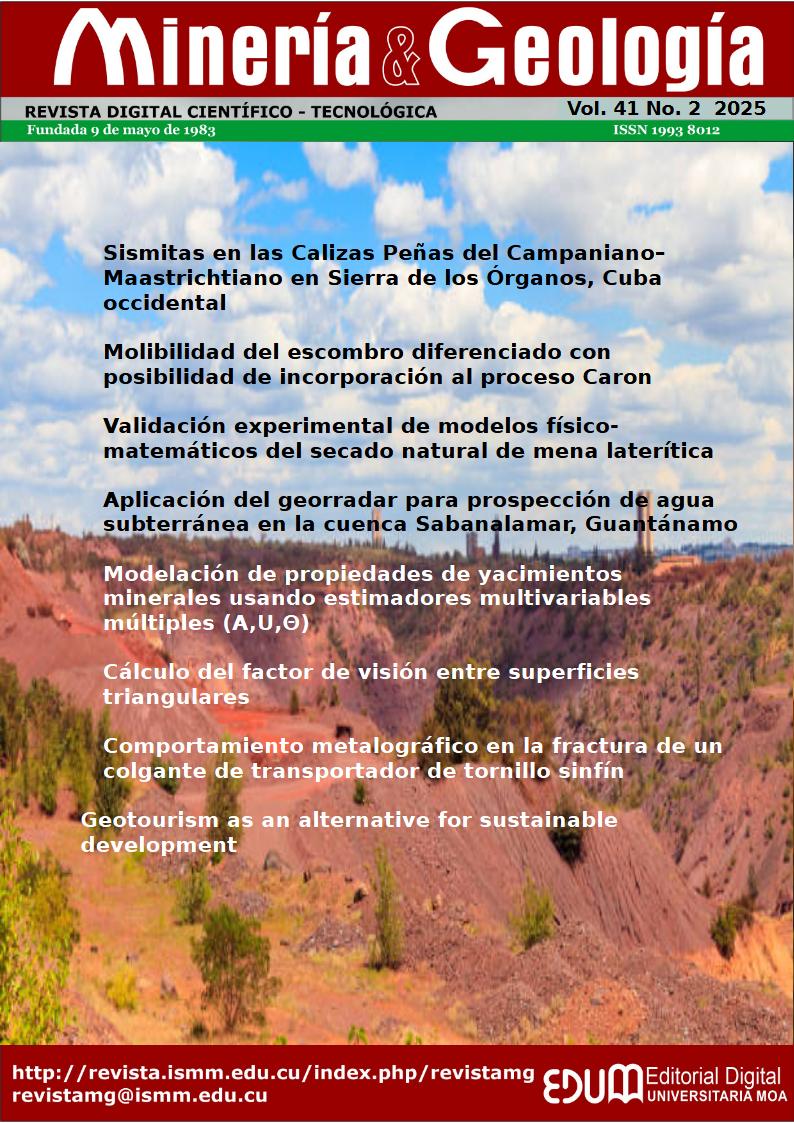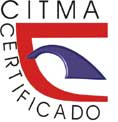Geotourism as an alternative for sustainable development
Palabras clave:
geotourism, sustainable development, sustainable tourismResumen
Geotourism is a tourism modality that has gained relevance due to its connection with sustainable tourism, offering a wide range of recreational and cognitively enriching experiences. In Cuba, although the government stimulates this type of tourism, and studies are being conducted to identify and highlight the heritage value of geosites, its visibility as a sustainable alternative remains insufficient to achieve a significant boost within the country´s tourism offering. Reversing this situation and promoting the broad and sustainable use of geosites on the island is a task that must be grounded in scientific foundations. Accordingly, a literature review was carried out to demonstrate the role geotourism plays in sustainable development, from an integrative perspective of science, technology, and society. The analysis conducted showed that geotourism can be an effective tool to preserve a region's natural and cultural resources and generate economic benefits. However, for it to be truly sustainable, it must responsibly consider the environmental, social and cultural impacts it can generate. In addition, scientific activity linked to geotourism must evaluate the current conditions and social perceptions of the environment, while promoting an ethic of preservation shared between tourism providers and consumers. It is concluded that it is essential to develop studies aimed at analyzing the role of science, technology and society in the implementation of geotourism, in order to identify the key factors that have an impact on its consolidation as a sustainable development strategy.Descargas
Citas
Abreu-Fernández, L. (2019). Evaluación de geositios del Arco Volcánico del Paleógeno, Santiago de Cuba. (Tesis de Grado, Universidad de Moa). Retrieved from: http://ninive.ismm.edu.cu/handle/123456789/3788.
Andrade-Alcívar, L. D. (2021). Gestión integrada del geoturismo para el desarrollo sostenible del cantón Pedernales, Manabí, Ecuador. (Tesis doctoral, Universidad Nacional Mayor de San Marcos).
Arslan, H. M., Khan, I., Latif, M. I., Komal, B., & Chen, S. (2022). Understanding the dynamics of natural resources rents, environmental sustainability, and sustainable economic growth: new insights from China. Environmental Science and Pollution Research, 29(39), 58746-58761.
Carcavilla, L., Belmonte, A., Durán, J. J. & Hilario, A. (2011). Geoturismo: concepto y perspectivas en España. Enseñanza de las Ciencias de la Tierra, 19, 81-81.
Carmona-Tamayo, E. & Extremera-San Martín, D. (2022). Cuba en Datos: Actividad geológica, geodiversidad y recursos minerales. Retrieved from: http://www.cubadebate.cu/especiales/2022/12/16/cuba-en-datos-10-anos-del-minem-actividad-geologica-geodiversidad-y-recursos-minerales/#:~:text=Seg%C3%BAn%20datos%20del%20Minem%2C%20en,de%20106%20948%20000%20pesos.
Carreño-Meléndez, F. & Carrasco-Aquino, R. J. (2018). Epistemología de la Sustentabilidad. Universidad Autónoma del Estado de México. Centro de Estudios e Investigación en Desarrollo Sustentable. Colophon academic editions. Retrieved from: http://www.siea.uaemex.mx/cedes/libros/epistemologiadelasustentabilidad_digital.pdf.
Cáseres, N. (2021). Senderos geoturísticos para el desarrollo sotenible en el municipio Moa. (Tesis de Maestría, Universidad de Holguín).
MINEM. (2024). Geositios. Retrieved from: https://www.minem.gob.cu/es/actividades/geologia/geositios.
Dowling, R. & Newsome, D. (2018). Geotourism: Definition, characteristics and international perspectives. In Handbook of Geoturism (pp. 1-22).
Franquiz-Domínguez, F. L. (2022, 16 de noviembre de 2022). Viaje al verde del caimán (Interview). Revista Bohemia. Retrieved from: http://bohemia.cu/viaje-al-verde-del-caiman/.
Garzón-Baquero, J. E. & Bellon-Monsalve, D. (2023). Emprendimiento social: elemento clave en la transformación de economías energéticas fósiles a economías del hidrógeno. Revista Venezolana de Gerencia: RVG, 28(103), 1237-1255.
Gobierno Vasco - Departamento de medio ambiente, p. t., agricultura y pesca. (2011). Geoturismo sostenible en la red de espacios naturales protegidos de la comunidad autónoma del país vasco: Red Geo-Basque - Resumen Ejecutivo. Dic 2011. Retrieved from: https://cpie-littoral-basque.eu/lib/pdf/460150.pdf.
Gomes, K. R. F. P., do Nascimento, S. M., Leite, E. F., Alves, J. L. & Development. (2020). Sostenibilidad y politicas públicas: Tratamiento en educación ambiental contemporánea. Research Society, 9(9), e707997880-e707997880.
Dowling, R. & Newsome, D. (2006). Geotourism. Elsevier, Butterworth-Heinemann, Oxford. ISBN 0-7506-6215-8, 10.1016/j.tourman.2006.04.010.
Hariram, N. P., Mekha, K. B., Suganthan, V. & Sudhakar, K. (2023). Sustainalism: An Integrated Socio-Economic-Environmental Model to Address Sustainable Development and Sustainability. Sustainability, 15(13), 10682. Retrieved from: https://doi.org/10.3390/su151310682.
Hernández, M. (2006). ¿Nueva modalidad? (Periodístico). Opciones. Seminario Comercial, Financiero y Turístico de Cuba. Retrieved from: http://www.opciones.cu/cuba/2006-01-21/nueva-modalidad.
Hose, T. A. (2012). 3G’s for modern geotourism. Geoheritage, 4(Pizzolante Negrón), 7-24. Retrieved from: https://www.academia.edu/29530053/3G_s_for_Modern_Geotourism.
Hurtado, F. (2010). Mesa de Trabajo 1: Turismo/Turismo Responsable. (Documento en línea). Resultados de las Mesas de Trabajo del 1er Congreso Nacional de Geoturismo. Mérida, Venezuela. Retrieved from: http://fundaciongeoparquesdevenezuela.blogspot.com/search?updatedmax=2010-06-22T11:05:00-07:00&max-results=7 [
Mattioli, L., Alonso-Frank, A., Romero, M. & Lenzano, K. (2016). Nuevo enfoque de desarrollo sostenible en turismo: el geoturismo. XXXIX Reunión de Trabajo de la Asociación Argentina de Energías Renovables y Medio Ambiente (ASADES). La Plata, Argentina.
Mori-Huaman, M., Ramírez-Pepe, O. M., García-Rivas, C. E. & Ishuiza- Tapullima, R. (2022). Turismo sostenible teniendo como base la evaluación de geositios. Revista Universidad y Sociedad, 14(3), 202-216.
Núñez-Franco, L. J., Sanabria-Rojas, B. H. & Suárez-Cruz, C. S. (2020). Geoturismo: aprovechamiento turístico del potencial geológico en las veredas de San Benito y San Eugenio, en el municipio de Sibaté (Geotourism: Tourist Use of the Geological Potential in the San Benito and San Eugenio Streets in the Municipality of Sibaté). Turismo y sociedad, 27.
World Tourism Organization, U. N. (2002). Contribuciones de la Cumbre Mundial de Desarrollo Sustentable en Johanesburgo. Retrieved from: https://www.unida.org.ar/Bibliografia/documentos/Desarrollo_Sustentable/GST/modulo4/WTO-contributions-esp.pdf
Parra-Cárdenas, A. V. & Duque-Cruz, L. G. (2020). El enfoque de ciencia, tecnología y sociedad en los estudios turísticos. Ciencia Digital, 4(1.1.), 70-88.
Peláez, O. (2022). Dispone Cuba de 484 geositios. Grannma. Retrieved from: https://www.granma.cu/cuba/2022-10-31/dispone-cuba-de-484-geositios-31-10-2022-20-109#:~:text=Cuba%20dispone%20en%20la%20actualidad,158%20radican%20en%20%C3%A1reas%20protegidas.
Reyna-García, J. A. (2020). Evaluación y diagnóstico de geositios en los municipios de la vertiente sur de la provincia de Granma Departamento de Geología. Retrieved from: http://ninive.ismm.edu.cu/handle/123456789/3850.
Salgado-Martínez, E., Canet, C., Cruz-Pérez, M. A., Mora-Chaparro, J. C. & García-Sánchez, L. A. (2021). Geoturismo como motor del desarrollo social, cultural y económico. In: Memoria de la Reunión Internacional «Geoparques, Turismo Sostenible y Desarrollo Local», Oficina en México de la Organización de las Naciones Unidas para la Educación, la Ciencia y la Cultura (pp. 187-195). Retrieved from: https://www.researchgate.net/publication/358712472_GEOTURISMO_COMO_MOTOR_DEL_DESARROLLO_SOCIAL_CULTURAL_Y_ECONOMICO.
Salinas-Chávez, E., Salinas-Chávez, E., & Mundetti-Cerdan, L. (2019). El Turismo en Cuba: Desarrollo, Retos y Perspectivas. Rosa dos Ventos, 11, 23-49. Retrieved from: https://www.redalyc.org/journal/4735/473559029004/473559029004.pdf.
Shao, Y., Huo, T., Yang, Y. & Li, Z. (2023). Does economic globalization shape the international tourism structure? A cross-national panel data estimation. Journal of Travel Research, 62(5), 1121-1139.
Tibacuy, C. A. D., Cáceres, A. H., Baquero, J. E. G. & Monsalve, D. B. (2022). Desde la sostenibilidad hasta el desarrollo sustentable: Una radiografía de la evolución del concepto. LATAM Revista Latinoamericana de Ciencias Sociales y Humanidades, 3, 1536-1550.
UN. (2024a). Objetivos y metas de desarrollo sostenible. Retrieved from: https://www.un.org/sustainabledevelopment/es/sustainable-development-goals/.
UN. (2024b). What is Sustainable Development? Retrieved from: https://www.un.org/sustainabledevelopment/blog/2023/08/what-is-sustainable-development/.
Vilchis-Chávez, A. R., Cruz-Jiménez, G., Vargas-Martínez, E. E. & Ramírez- Hernández, O. I. (2023). La sustentabilidad en el turismo. Una revisión bibliográfica de su estudio. Estudios sociales. Revista de alimentación contemporánea y desarrollo regional, 33(62).
Zarta-Ávila, P. (2018). La sustentabilidad o sostenibilidad: un concepto poderoso para la humanidad. Tabula Rasa, (28), 409-423. http://www.redalyc.org/articulo.oa?id=39656104017.
Publicado
Cómo citar
Número
Sección
Derechos de autor 2025 Yanisel Batista-Nuñez, Arlenys Carbonell-Pupo, Yurisley Valdés-Mariño., Carlos Batista-Matamoros

Esta obra está bajo una licencia internacional Creative Commons Atribución-NoComercial 4.0.
Los autores que publican en esta revista están de acuerdo con los siguientes términos:
- Licencia Creative Commons Atribución-NoComercial permite que el beneficiario de la licencia tenga el derecho de copiar, distribuir, exhibir y representar la obra y hacer obras derivadas para fines no comerciales siempre y cuando reconozca y cite la obra de la forma especificada por el autor o el licenciante.
- Los autores pueden establecer por separado acuerdos adicionales para la distribución no exclusiva de la versión de la obra publicada en la revista (por ejemplo, situarlo en un repositorio institucional o publicarlo en un libro), con un reconocimiento de su publicación inicial en esta revista.
- Se permite y se anima a los autores a difundir sus trabajos electrónicamente (por ejemplo, en repositorios institucionales o en su propio sitio web) antes y durante el proceso de envío, ya que puede dar lugar a intercambios productivos, así como a una citación más temprana y mayor de los trabajos publicados (Véase The Effect of Open Access) (en inglés).
- Lo anterior debe realizarse siempre sobre el artículo ya publicado por Minería y Geología.
La revista permite que los autores tengan los derechos de autor sin restricciones
La revista permite que los autores conserven los derechos de publicación sin restricciones










